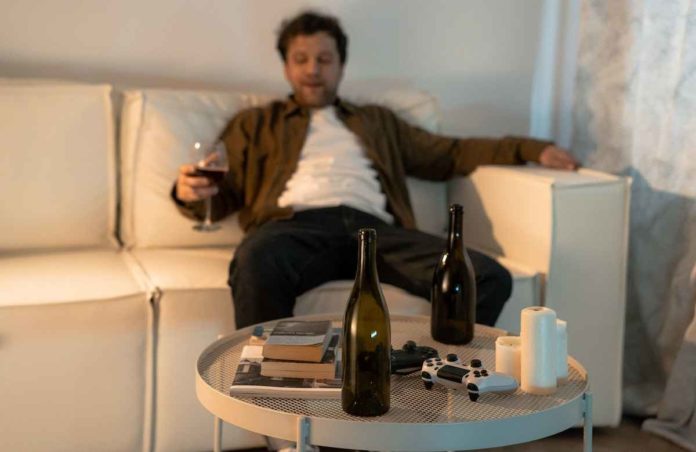Alcohol (also known as ethanol) is a psychoactive substance that induces feelings of euphoria and relaxation in small amounts. Unlike most other psychoactive substances, its use has been largely normalised within Western society. In England especially, where the so-called drinking culture is a widespread phenomenon, we have become accustomed to using alcohol as a means of reducing anxiety in social situations.
However, the link between anxiety and alcohol use is a complex one, and it requires a certain level of insight into its chemical properties and its capacity for potential dependence and addiction in order to try to assess it.
Table of Contents
How Does Alcohol Affect Us?
Alcohol is an inherently contradictory substance. It is classed as a depressant, but the depressant qualities usually only emerge when it is taken in large doses. In small doses, it possesses stimulatory qualities which lead to increased exuberance and sociability. It is for this reason that it has become so popular as a means of reducing social anxiety in group settings. It creates effects such as happiness and relaxation, as well as a lowering of inhibitions. These pleasant effects, however, are usually temporary and are replaced by less pleasant outcomes such as:
- Nausea
- Vomiting
- Imbalance
- Memory loss
- Increased blood pressure
Alcohol induces these changes by acting as a central nervous system depressant, suppressing activity in your nervous system. It enhances the effect of a specific neurotransmitter called gamma-aminobutyric acid (GABA) which lessens a nerve cell’s ability to transmit information to other nerve cells. This is the reason alcohol produces calming feelings of sedation and lowered anxiety in low doses.
Alcohol certainly relieves anxiety in certain situations. However, alcohol is a substance with a high potential for addiction. This means that prolonged alcohol use can turn into a diagnosable substance disorder. Chasing the anxiety-relieving effects of alcohol can therefore have the reverse effect when you become dependent on alcohol to function. Too much of any good thing is liable to hurt you in some way eventually. It can have proven ramifications on both your physical and mental health.
The more that we drink over a prolonged period of time, the more we need to achieve the same feelings of relaxation. This can also lead to the appearance of a dangerous alcohol use disorder, wherein we feel anxious when we do not have alcohol and wake up with anxiety as a result of cripping hangovers and tattered memories of shame from the night before.
How Alcohol Can Cause Anxiety
An overreliance on alcohol can lead to impaired function of your GABA receptors. When you suddenly stop drinking, your brain is unable to cope by itself, and withdrawal symptoms kick in. Suddenly the pleasant relief you once got from alcohol turns into anxiety and stress as you start to uncontrollably crave alcohol.
It is at this point that most people start to realise that, despite the normalisation of alcohol within the UK, it can have rampant damaging effects on our psyche. The links between alcohol use and mental disorders such as depression are well established, and it is certainly a contributory factor when it comes to the outbreak of anxiety attacks in people with alcohol use disorders. The fact that depression is also known to cause anxiety attacks by itself should be taken into account as another reason to avoid excessive alcohol use. The subsequent withdrawal symptoms that emerge as a result of this including sweating, shaking, seizures, and hallucinations. They are highly unpleasant and only add to this developing anxiety that prolonged alcohol use causes. As we can see, the relationship between alcohol and anxiety is a complicated one and can lead to a vicious cycle of abuse.
Even as we chase short-term effects, we should keep in mind that cutting down alcohol use to recommended amounts (two drinks a day for men and one drink a day for women) can lead to a number of anxiety-relieving consequences such as:
- Improved sleep
- Increased energy
- Improved digestion
- Increased focus
- Decreased likelihood of depression.
Even though it can be pleasurable to relax at the end of a long day with a cold beer, and it can certainly feel pleasant, it does not mean that it is an effective long-term strategy in dealing with anxiety caused by the pressures of day-to-day life. As a mood-regulating regime, it simply does not work. The general medical advice when dealing with anxiety is to specifically avoid drinking, as it will only exacerbate your symptoms.
There have been a variety of research conducted in order to study this very relationship. One particular study investigated whether there was a difference in predicted anxiety levels between people who were given alcohol and those who were given a placebo. It was conclusively found that people who did not reduce their alcohol intake by the end of the study were much more likely to have increased anxiety levels, whereas those who did reduce their daily alcohol reported decreased anxiety and overall improved general mental health states.
As we can see, despite alcohol’s outwardly anxiety-relieving effects, it is not as simple as that. When prolonged alcohol use turns into dependency, it always produces the opposite effect, sending people into a spiral of anxiety and stress as they struggle to cope with their bodies’ adjusting to living without the alcohol that it now craves.














